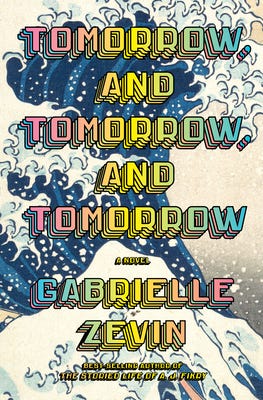Tomorrow, and Tomorrow, and Tomorrow
Creativity, love, friendship, loneliness—all in the context of video game creation
Date read: February 2024
Date published: July 2022
Summary
Spanning thirty years, from Cambridge, Massachusetts, to Venice Beach, California, and lands in between and far beyond, Gabrielle Zevin's Tomorrow, and Tomorrow, and Tomorrow is a dazzling and intricately imagined novel that examines the multifarious nature of identity, disability, failure, the redemptive possibilities in play, and above all, our need to connect: to be loved and to love. Yes, it is a love story, but it is not one you have read before. (via Goodreads)
The Good
Every review you’ll read about this book will talk about how it’s a love story, but not a typical one. I tried to come up with another take, but it’s actually the best take. So I’ll repeat it here. Zevin does an amazing job of creating non-romantic intimate relationship ups and downs, tension, admiration, resentment, isolation, wanting to hear from the other person so badly—these emotions are all treated delicately but communicated so powerfully in this book. There were so many moments in this book when I was just sitting with one of these characters, understanding their deep and complicated emotions. That’s a great reading experience.
The main characters, Sam and Sadie, bonded as kids in a hospital waiting room, and they then run into each other as college students in Boston. They decide to work together on a video game, and suddenly they’re off with an extremely successful company. About halfway through, the team is struck by tragedy, at which point the story is again about the vacillation between isolation and depression, and redemption and forgiveness. And about creativity, and innovation.
I appreciated the care that was given to the thought process behind creating new worlds through video games. It wasn’t about the business of creating these games, but rather the treatment of human journeys and experiences. In a way, the second half of the book is about how creativity can save people and bring people together.
The Bad
You may end up not liking the main characters very much, but to me, that’s not a reason not to enjoy a book. Zevin does introduce another character that sort of represents the moral compass of the book, but part of the beauty of this book is that the damaged main characters are just that, because of a bunch of stuff that happened to them in the past. I’ve learned a lot about the idea of “mitigation,” because it’s what my wife does for a living. Part of what I’ve learned is that when people do bad things, it’s usually because bad things happened to them. But, do you have to love the characters to love a book? I don’t.
The other criticism of this book is possibly a heavy-handed entry of the negative effects of social media, technology, and politics. It’s an important plot point, and didn’t take away from the overall experience of reading this book.
My Rating
8/10 — compelling, memorable, unique






This is on my TBR list and this review has it moving up. I completely agree on when an author sets you up with characters that sit with you and make you think about how you’d react in those situations.The part you bring up about people being a product of their past is an important one. If nothing else, it makes me much more mindful of how we all treat each other. Thanks RJ!